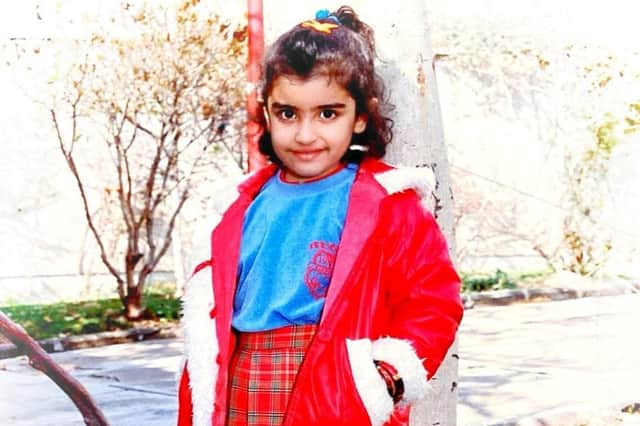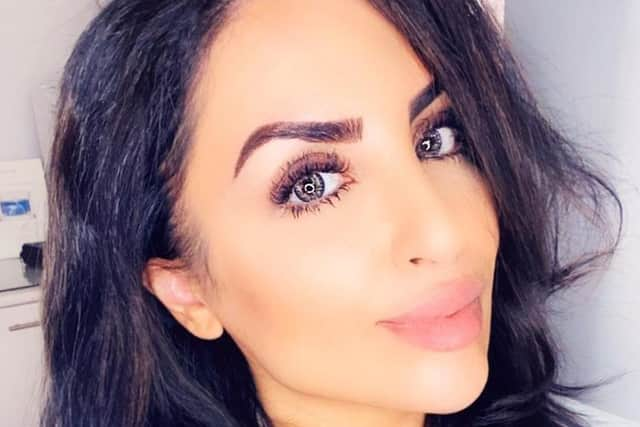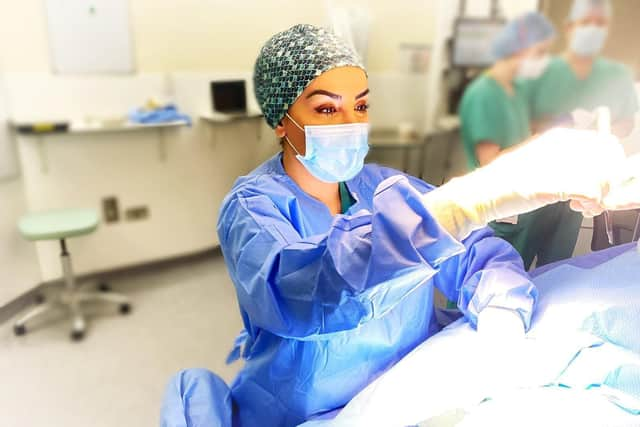From political refugee to Dundee surgeon, one woman tells of her journey into a new life


Dr Maya Shahsavari recalls the words of her father not long after her family had arrived in the UK as political refugees from Iran.
She was 13 and, she says, felt lost by the dramatic 4000-mile move from a middle-class lifestyle in Tehran to living in temporary accommodation in north London unable to speak a word of English.
Advertisement
Hide AdAdvertisement
Hide Ad“I asked him what on earth am I going to do with my life? I don't even speak a word of English, I don't understand what's happening. I don't know if I can become anyone... I just don't see, you know how to get out of this current situation.


“And that’s what he told me, and looking back on it I knew I had to respond to the freedom we’d been given in this country. I remember I had sat there in my room trying to think the biggest way I could do that and coming from a cultural background where you're either a doctor or a lawyer, I thought, well, I don't just want to be a doctor, I really want to be people's last resort, I want to be someone that you call when you have nothing else left. And that's how I settled on surgery. I wanted to be a surgeon.”
She adds: “I had no idea the road that I'd have to take, the sacrifices and everything along the way. But I settled on this and I set my heart on it.”
Now 37 and working in Dundee as an Ear, Nose and Throat surgical registrar at Ninewells Hospital, as well as being an honorary lecturer at Dundee Medical School and an advanced aesthetician, Dr Shahsavari says she hopes her story will prove inspirational to young refugees in the UK today as the world marks the United Nations’ Refugee Day.
"What my parents had to face was absolutely terrifying. In our household we had been brought up with freedom of thought and speech and we were not particularly religious. But at the time Iran switched to a national religion of Islam. My parents were not compliant with that – they didn't want to bring us up in that way,” she says.


“When my parents were younger they were activists against forcing religion and forcing a particular way of living on people, and so they were political activists. That's how they met.
“They were on a list, always been watched over making sure that they were no longer continuing activist type actions and not speaking out against Islam. They weren’t doing that as my dad was a dentist, my mum was a personal trainer, and they had three kids, so were just living a normal life. At least until it was their turn to be arrested and interrogated.
“They were both taken and questioned and imprisoned, and then released while the authorities decided if they would be executed or imprisoned. My parents decided the safest thing to do was to leave Iran and that’s how we ended up in the UK.”
Advertisement
Hide AdAdvertisement
Hide AdShe adds: “I remember very vividly it was a massive shock to the system. You don't pack things and move things with you. You just have what you're wearing, you get on a plane, and you get off the plane. So we just turned up here introduced ourselves at the borders as refugees and it took a good few years for the case to be processed. It was a bleak time.
“But they wanted to create a better life for us. Arriving in the UK, we had nothing, we didn’t know anyone, there was no one to lean on for support or guidance, and in turn, this really brought us together as a family.
“Rock bottom is a very powerful place to be, either you hit it and you stay there, or you hit it with such a velocity that you have no way no other option but to go up. And I feel that that's what happened to me. My story is one of success, but there is still so much work to be done around the world in ensuring that refugees are safe, that the help and support is in place which they all so desperately need.
"They could be a doctor, a lawyer, a politician, but they need to be given the chance and the hope to achieve their dreams, and I can only hope my story serves as comfort to them that anything is possible."
Dr Shahsavari believes little has changed for refugees in the UK since her family arrived 24 years ago, and the “hostile climate" which the Home Office has been accused of creating, also existed in 1997.
"We didn't have official permission to be in the country so the case was under review for years, so my parents couldn’t work for the first two and a half years into us being here.
“We were placed in a hostel, which housed a variety of people, not just refugees, so we had lots of sort of drug addicts and people going through addiction therapy. We stayed there for a few months and then we were placed in another accommodation temporary accommodation.
“My parents had to go into the DSS and stand in a queue for some coupons and a finite amount of money per week based on how many children you have. We would window shop at our weekly trip to Tesco on a Friday knowing we only had enough money for a loaf of bread.
Advertisement
Hide AdAdvertisement
Hide Ad“It was just really difficult at the beginning, because we come from such abundance back home. It was really hard on my parents because they weren't able to provide for us the same way they would have done back home though they never let us see that.
“Now that I'm older, and I speak to them about it, I do know all this stuff that was going behind the scenes although they would be very collected and self assured in front of us. And I think there were a lot of breakdowns behind the scenes.
“At one point my dad would walk me all the way from Finsbury Park where we were, to Angel where my school was. That’s a good couple of hours walk, because there were times where we didn't have enough money to get on the bus.
"And obviously there was relentless bullying at school, so you kind of just didn't even want to go. Basically it was I didn't speak a word of English. And when I did start to pick words up, I would look them up in dictionaries and find there were not very kind words.”
World Refugee Day and its focus on the 133,094 refugees, 61,968 pending asylum cases and 161 stateless persons in the UK, is helpful, she says for both refugees and the rest of the general public.
“You automatically assume that you're inferior in the opportunities available to you because you've come to this country late,” she says, “and because you don't speak English, because you’re poor, and you think that the things that are available to everyone else are not available to you, so having stories like mine out there on a day where everybody has had their attention drawn to it, I think it's really significant.
"If you want to see yourself as inferior, as misjudged, as somebody who's constantly attacked for not belonging, and if you bring that sense with you throughout your life, then that is how you will be treated, so to have stories like mine out there, I think it helps more people like myself, as well as the public to understand that actually, there are opportunities available but yes you have to work harder.
"You need to learn the language, you need to integrate into an education system that's very different to what you're used to. That's hard. But that's just life. You know, if you take somebody from the UK and place them in Pakistan, or Iran or anywhere else, they're gonna find it just as hard, it doesn't mean they're inferior.
Advertisement
Hide AdAdvertisement
Hide Ad"Yes it will take you twice as long, it took me two other degrees just to get into medical school. But that's just part of the journey that I had to go through. And nobody forced me to do it. I'm the one who put myself on this path.
“I have a friend from medical school, I'm godmother to her children, and she is very much British and white. Our journeys are different, we may have ended up on the same path with the same outcome.
"I think for as long as you feel victimised by your circumstances, you will remain the victim. It doesn't matter if you live in Iran, if you live here, it doesn't matter. The keys are in your own hands.
"So I think having a World Refugee Day, and bringing attention to it is not just beneficial because the rest of the public can educate themselves about what it is to be a refugee, but also, lots of other refugees who feel that their world has ended is how I felt when I moved here, and I am here to say that doesn’t have to be the case.”
Dr Shahsavari says the recent protest in Glasgow to prevent two refugees from being removed by the Home Office was “beautiful to see”.
"When I was moving to Scotland I was told Scottish people are not very friendly, and it was bad enough that I'm brown, but I'm also a southerner. But it's the most magical land ever, and the people are honest.
"They tell you what they think to your face. You don't have to be worried about people stabbing you in your back and talking behind your back. If you do something and they don't like it, they tell you. It’s not racist but honest and it’s very refreshing.
"People are so helpful. When I first moved up here and had to ask directions people would walk me halfway there, show me where to go, walk with me… that never happens in beloved multicultural London where people don't even make eye contact. So the scenes from Glasgow are just an extension of my absolute everyday experience in Scotland since 2018. People can't do enough for you.”
A message from the Editor:Thank you for reading this article. We're more reliant on your support than ever as the shift in consumer habits brought about by Coronavirus impacts our advertisers.
If you haven't already, please consider supporting our trusted, fact-checked journalism by taking out a digital subscription.
Comments
Want to join the conversation? Please or to comment on this article.